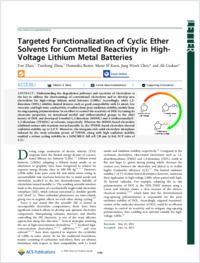Targeted Functionalization of Cyclic Ether Solvents for Controlled Reactivity in High-Voltage Lithium Metal Batteries
DOKPE
- Zhao, Yan ORCID University of Fribourg
- Zhou, Tianhong ORCID University of Fribourg
- Baster, Dominika ORCID Paul Scherrer Institut, Villigen, Switzerland
- El Kazzi, Mario ORCID Paul Scherrer Institut, Villigen, Switzerland
- Choi, Jang Wook ORCID Seoul National University
- Coskun, Ali ORCID University of Fribourg
- 27.06.2023
Published in:
- ACS Energy Letters. - American Chemical Society (ACS). - 2023, vol. 8, no. 30, p. 3180-3187
Materials Chemistry
Energy Engineering and Power Technology
Fuel Technology
Renewable Energy
Sustainability and the Environment
Chemistry (miscellaneous)
English
Understanding the degradation pathways and reactivity of electrolytes is the key to address the shortcomings of conventional electrolytes and to develop new electrolytes for high-voltage lithium metal batteries (LMBs). Accordingly, while 1,3-dioxolane (DOL) exhibits desired features such as good compatibility with Li metal, low viscosity, and high ionic conductivity, it suffers from poor oxidation stability, mainly from its ring-opening polymerization. In an effort to control the reactivity of DOL by tuning its electronic properties, we introduced methyl and trifluoromethyl groups to the ethyl moiety of DOL and developed 4-methyl-1,3-dioxolane (MDOL) and 4-(trifluoromethyl)-1,3-dioxolane (TFDOL) as solvents, respectively. Whereas the MDOL-based electrolyte exhibited serious side reactions toward metallic Li, the TFDOL-based electrolyte showed oxidation stability up to 5.0 V. Moreover, the inorganic-rich solid electrolyte interphase induced by the weak solvation power of TFDOL along with high oxidation stability enabled a robust cycling stability in a Li|NCM811 full cell (20 μm Li foil, N/P ratio of 2.5).
- Faculty
- Faculté des sciences et de médecine
- Department
- Département de Chimie
- Language
-
- English
- Classification
- Chemistry
- License
-
Rights reserved
- Open access status
- green
- Identifiers
-
- DOI 10.1021/acsenergylett.3c01004
- ISSN 2380-8195
- Persistent URL
- https://folia.unifr.ch/unifr/documents/325452
Statistics
Document views: 179
File downloads:
- acsenergylett.3c01004: 497
